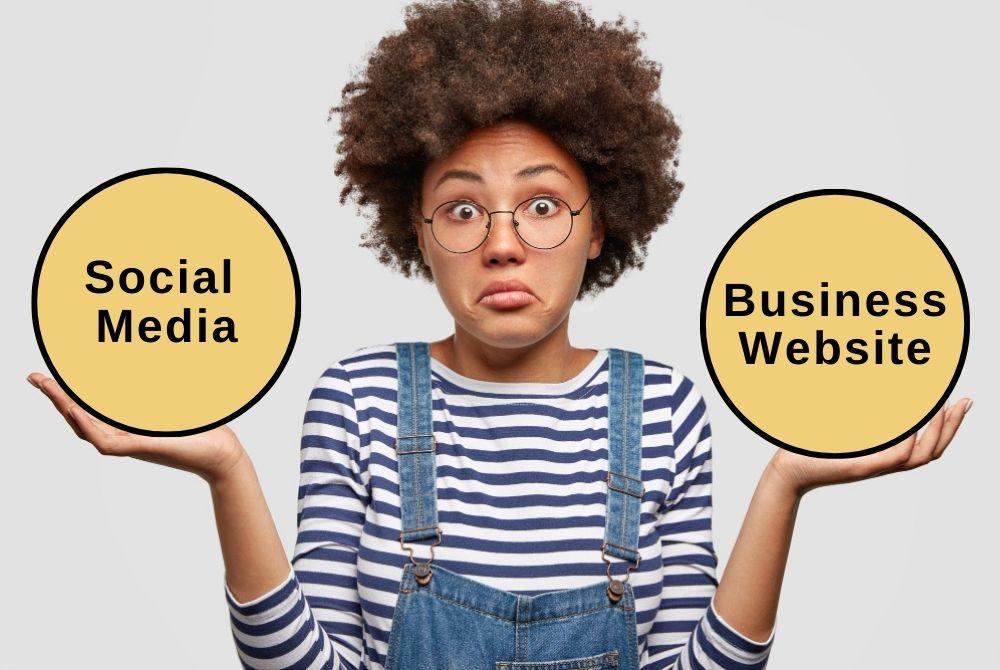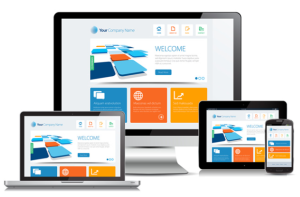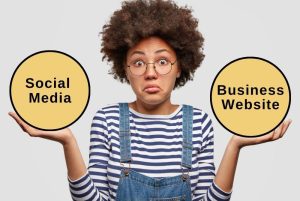Website vs Social Media for Business.
| Heading | Description |
|---|---|
| Introduction to Startup Marketing | Overview of the importance of online presence for startups. |
| The Digital Battlefield: Website vs Social Media | Comparing the two dominant online marketing platforms. |
| What Startups Need from Online Platforms | The essential elements startups should consider for online marketing success. |
| Building Credibility with a Website | How a website builds authority and trust for a new business. |
| Brand Consistency on a Website | Importance of maintaining consistent branding through a dedicated website. |
| Social Media’s Strength in Engagement | Highlighting the power of real-time interactions on social media platforms. |
| Website vs Social Media: Control and Ownership | Exploring platform control and content ownership differences between the two. |
| SEO Potential: Why Websites Lead to Long-Term Growth | How SEO helps websites sustain visibility and attract organic traffic. |
| Social Media’s Viral Potential for Startups | How viral content on social media can quickly boost startup visibility. |
| Cost Effectiveness of Website vs Social Media | Analyzing the costs associated with building and maintaining a website vs social media. |
| Lead Generation: Why Websites Dominate | How websites convert traffic into leads and customers more efficiently. |
| Social Media for Brand Awareness | Why social media excels in brand exposure and building a following. |
| User Experience: Navigating a Website vs. Social Media | Comparing user experience and navigation between websites and social platforms. |
| The Role of Analytics in Growth | How data from websites and social media can drive decision-making for startups. |
| Flexibility of Design and Customization | Comparing the customization options of websites vs the limited templates of social media. |
| Advertising Opportunities: Website vs Social Media | How paid advertising works on websites compared to social media campaigns. |
| Website as the Hub of Your Digital Presence | Why a website should be the central point of your online marketing efforts. |
| Social Media as a Gateway to Your Website | Using social media to funnel traffic to your main business site. |
| Omni-channel Strategy: Why You Need Both | Discussing the benefits of using both platforms in a cohesive strategy. |
| Website’s Role in Customer Trust and Loyalty | How a website helps establish a long-term relationship with customers. |
| Instant Feedback: Social Media’s Unique Advantage | How startups can benefit from instant feedback and trends on social media. |
| Ownership of Data: The Risk of Social Media Dependence | The risks of relying solely on social media, where data isn’t owned by the business. |
| The Power of SEO: Why a Website Matters | Explaining the importance of search engine rankings and how websites perform better in SEO. |
| E-commerce Integration: Website vs Social Media | How websites and social media differ in offering e-commerce solutions. |
| How Social Media Trends Impact Startup Growth | The effect of staying on top of social media trends and its risks. |
| Scalability: Why Websites Offer Long-Term Flexibility | Websites’ ability to scale as startups grow vs limitations on social media platforms. |
| When Social Media is Not Enough for Your Startup | Why relying solely on social media can restrict business growth. |
| FAQs | Common questions about choosing between a website and social media for startups. |
| Conclusion | Summarizing the pros and cons, and determining the best platform for startups. |
Introduction to Startup Marketing
In this case, the startup ecosystem is relatively saturated and constantly evolving, and a solid and stable connection with the Internet could define the fate of a business. In process-based industries, the main business model that most startups leverage to begin generating revenue is the ability to get to the target customer online. Nevertheless, in the context of Internet marketing and, in particular, of the niche in question, there are significantly more opportunities to spread the word and develop initial interest and recognition than is the case with traditional marketing tools.
The question arises as to where exactly a startup should focus their efforts, should they build a website, hire services for social media marketing, or both? These are the pivot choices that define whether a business is expanding by undertaking further expansion or whether a business is contracting through making several mistakes.
Advertising is also an effective method where websites and social media present good opportunities. However, it is essential to know which of the two yields more Return On Investment (ROI). These two platforms will then be identified in terms of the roles they play so you are informed which can truly skyrocket your startup growth or if likely, it is the synergistic blend of both that can produce the most phenomenal results for your startups.
The Digital Battlefield: Website vs Social Media
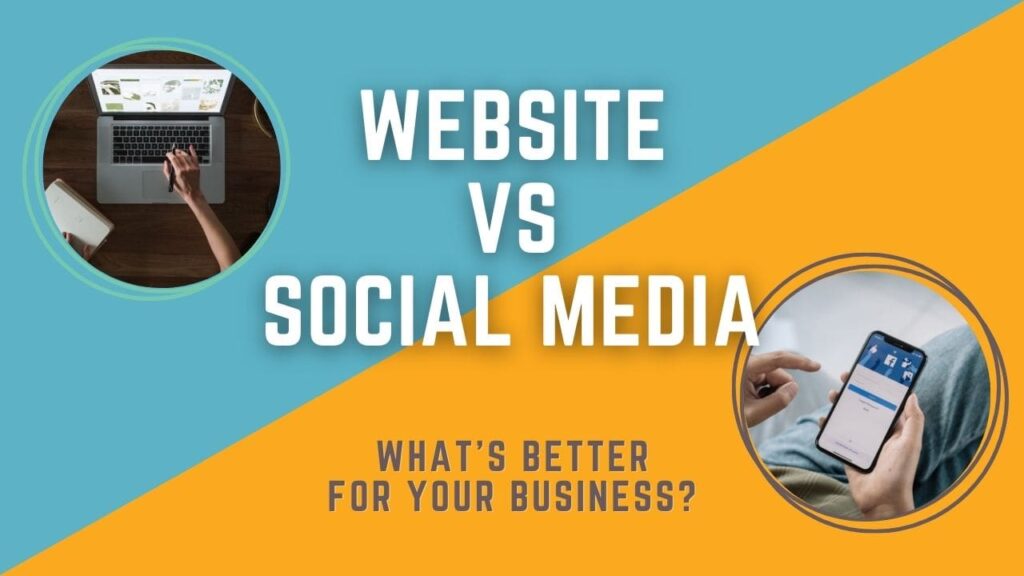
The clash between websites and social media is like being caught between two giants of the web technology world. However, they have different implications and exist as two separate services of the network. Since we are oriented on the key characteristics of both, let us delve into the details to clarify how a startup can benefit from them.
A website is very useful in business since it offers the public an efficient means through which they can be informed of the identity of the business owner, what the business sells, and how they run the business. This is where the components of UX design and the type of content startups provide to their audiences can be fully owned to gain credibility.
On the opposite extreme, social media platforms like Instagram, Facebook, and LinkedIn have high interaction intimacy since business people can readily communicate with their audience. These are ideal for brand building for initializing the engagement process and for getting first-hand feedback about the new product.
Both platforms have their utility. Consequently, the question of which one will be more appropriate for a specific startup and for what it requires in the present and the future.
What Startups Need from Online Platforms
Startups face different challenges than established businesses, and their online marketing platforms need to meet several specific needs:
- Credibility and Trust: A customer will always prefer to deal with that company taking a view of the credibility of the firm in the market over the other. This can be done through a professional Website where one can post their profiles and written and /or video testimonials to assure the employers of their competency and reliability.
- Lead Generation: They aim at converting users into customers and leads can be sourced from both website and social media platforms. But what I came across is that websites, in general, offer more features for collecting leads through forms, downloads, and gated content.
- Customer Engagement: Customers of today expect businesses to be available and ready to respond to their questions with the immediate answers that social media offers with customer engagement. It also showed how new emergent businesses can use it to obtain immediate feedback, in addressing questions as well as forming relations.
- SEO and Discoverability: Being found online is important for business growth, and SEO makes this happen strategically. Websites can be created for search engines and therefore more longevity for the content as compared to social media where visibility of the posts is decided by algorithms.
- Scalability: New businesses would need to have marketing instruments that would work well at their relatively higher growth rate. In my perspective, websites have the potential for long-term sustainability which the online communities of social media platforms lack.
As for the key needs of a startup, the problem is to determine whether a website and social media can be an answer to these needs and cover the organizational goals of the company.
Building Credibility with a Website
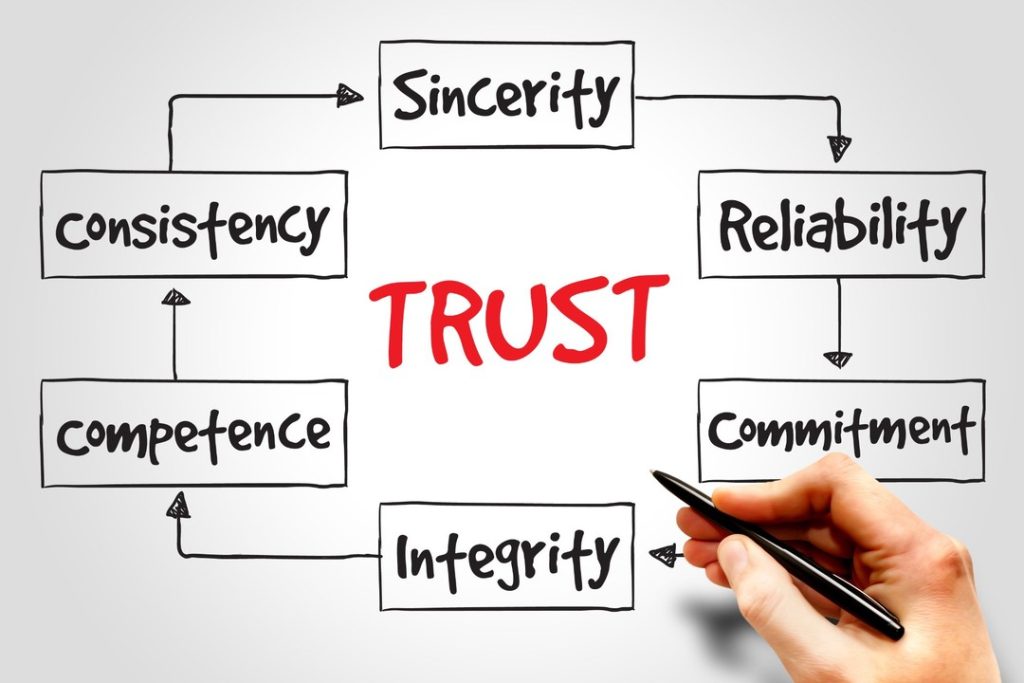
Startups must have credibility if they are to secure customers, investors, or partners in the business world. While social media will assist you in reaching out to your target audience, a website is key to establishing the trust and credibility of your brand.
Having a professional website design makes your new business look like it has been there from the beginning. Customers expect firms to have an official website that customers can visit at their convenience, and to be provided with a controlled website where they can learn more about the firm. While in social media networks, you are limited with the layout and content rules, a website gives full freedom. With it, you can share the story of your brand, introduce testimonials, put together a product catalog, and even provide access to certain services by hiding them behind a paywall or with membership access.
For instance, a consulting startup may use its website to post its portfolio information, while an e-commerce startup can ensure confidence in the startup by providing checkout details and detailed product information. Both create a perception in the mind of the customer that their information is safe and the business is credible.
Brand Consistency on a Website
It is essential to manage and coordinate branding to create and sustain a familiar and dependable image for customers. Compared to other methods of advertising, a website offers the flexibility of fully controlling branding factors such as logo positioning, choice of colors, type of fonts, and tone of communication.
Social media presents you with certain limitations due to its features that are inherent to the particular social site. Yes, it is possible to place a profile picture and cover picture specific to the business and also any wall post or picture that would be specifically in the business’s theme colors and logos However, one has to remember that the platform owner has a right to make certain changes to the overall layout. Websites, however, are free, free from any external or internal interference. Business leaders can tell their pro-active story and give the consumers a constant experience of the brand across multiple pages. 000
It is especially useful when your business develops as the consistency of the brand identity reduces any confusion the buyers might have. So, the website becomes the key tool for branding, while social media serves as a secondary tool for reaching out to the target audience.
Social Media’s Strength in Engagement
It is in engagement that social media excels the most. Whether this be a Facebook comment section, an Instagram Story poll, or a live tweet, social platforms let businesses engage with the audience. This is good news for start-ups where feedback and relationship building are paramount, social media can be a pure source of life.
Instagram and X (formerly Twitter) are ideal for startups since they allow for the building of lasting discussions with clients. Thus, one can share the news, answer questions, and even realize people’s interest in potential products before they are introduced into the market.
Also, when many individuals actively participate in commenting and sharing posts, social media algorithms will positively respond to them. Whenever there are posts that attract a lot of likes, shares, or comments, this will in turn be boosted thus extending the reach of the brand further. This is especially beneficial for companies that are new to social media and have a small marketing budget because viral posts can attract a large audience without having to spend money on ads.
Website vs Social Media: Control and Ownership
Another major factor of differentiation between a website and social media is the question of power, including who has it and over what. In essence, when one owns a website, he/she plans for it, including its looks, how users will interact with it, and even what they have to see once they are there. Most importantly, you own all the data collected from your visitors, which may include vital information such as their contact information, their behavior, and their preferences, etc.
Whereas the mass media can be regulated to a considerable extent, social media provides you with minimal control over it. The platform holds the data and you have no control over any change in algorithmization, policies, and even account deletions. This means that if a platform like Instagram decides to change the algorithm, you could lose a big portion of your organic reach in one night. Likewise, if the site ceases to operate (as was the case with Vine or Google+), you even lose all the connections and content that you have taken time to develop on the social media platform.
To the startups, creating a website as part of their initial establishment means that they will be able to exercise control over their external environment. This means that although social bookmarking serves the purpose of driving traffic to the website, the website still remains a stable platform for your brand.
SEO Potential: Why Websites Lead to Long-Term Growth
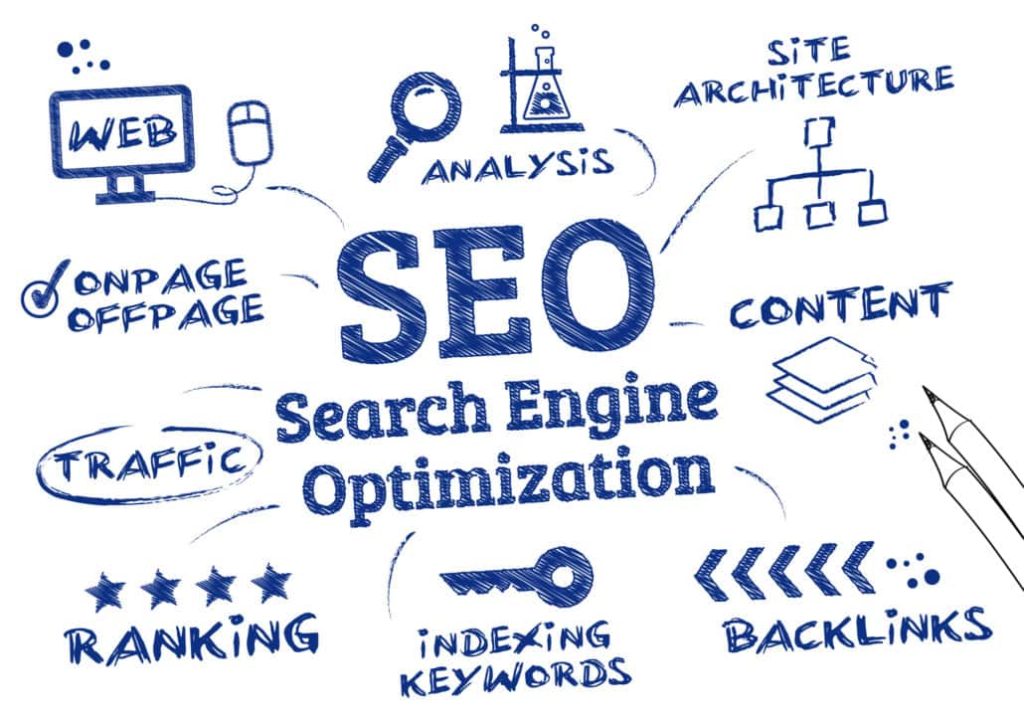
SEO is a slow process with long-term benefits since it aims at positioning the business at the top of search engines such as Google to help prospective customers find it easily. Although social networks have relatively low SEO capabilities, websites guarantee accessible growth.
Research has shown that when one optimizes the websites for keywords, meta descriptions, internal linking, and fast loading speed, the chances of such a website appearing in the search engine results are high. This means that instead of a constant barrage of traffic that may not necessarily be interested in the service, there is gradually increasing traffic referred to as organic that would in turn bring in leads in the longer run. Traditional social media platforms can be effective for short-term interaction, but their effectiveness depends on algorithms that change from time to time.
For startups, getting a website with the proper SEO implementation is akin to sowing a seed that bears fruit in the future. Whereas social media allows getting a brief exposure, a website serves as a foundation for sustainable visibility.
Social Media’s Viral Potential for Startups
Social networks are unbeatable when it comes to the shareable factor. There are cases whereby startups would go viral within hours if the content created is fascinating to the users. Social media can be used to promote your products through viral marketing techniques at a relatively low cost, which is very important for new business entities.
For example, startups in the fashion business food business, or any tech startup can leverage TikTok or Instagram Reels. Thus, through producing content that one can easily share and can easily resonate with, they can easily gather thousands, if not millions of viewers, effectively placing their brand on the map in just a few days.
But this viral nature is unpredictable and even though social media gives a brand instant visibility it does not necessarily translate into long-term customer patronage. That is why social media that make content go viral can be complemented by a website that is your brand’s Home Page.
Cost Effectiveness of Website vs Social Media
Some of the most common questions that every startup faces are related to the choice of the platform, such as “Which platform will help me get the highest ROI?” Nonetheless, concerning the initial cost, that is, the cost a company incurs to begin using social media, the latter is cheaper. Signing up for accounts on social media such as Facebook, Instagram, or LinkedIn does not cost any money, and advertising on these social media sites can also be affordable even with a small amount of capital.
However, for websites, there may be costs incurred for domain names, web hosting, and web designing. However, the initial costs of owning a website are worth it in the long run. Websites remain your business’s tool for years while social media advertising needs constant spending.
Also, managed exclusively with customer acquisition through social networks, means that you are always a hostage to changes in the settings of these platforms, which may increase your costs or decrease your reach for free accounts. , overly optimized website, on the other hand, can keep on attracting traffic consistently without requiring spending a fortune on its advertising.
Lead Generation: Why Websites Dominate
In the case of lead generation, websites hold a definite edge over other mediums. Thus, using such elements as lead capture forms, downloadable resources or live chat can help to sell website visitors much more effectively than potential customers found on social networks.
The social media alternative is useful in raising brand consciousness but is comparatively less helpful in converting website visitors into leads. A user who comes across your post on social media may interact with your content, but to take them through the funnel is quite a task without proper tools. Such tools are available on a website through forms, e-commerce, or sign-up for emails.
For startups in particular, any business development strategy should focus on generating a constant and continuous stream of leads, for which creating a high-quality website with appropriate calls to action (CTAs) is a must.
Social Media for Brand Awareness
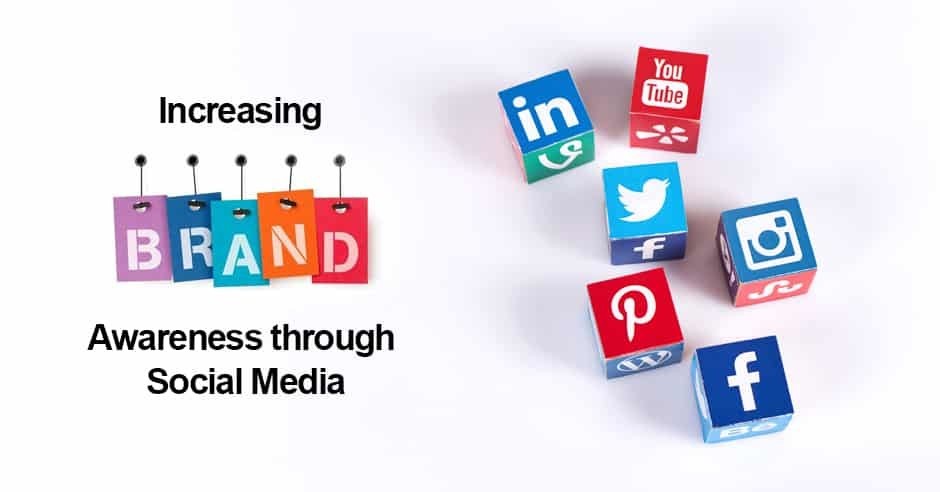
There is no doubt that social media plays a huge role in growing the recognition of the brand. Therefore, outlets such as Instagram, Facebook, and LinkedIn make an excellent marketing opportunity that makes the Brand accessible to a large audience that might not otherwise come across its products. People can instantly share information, communicate with targeted demographics, and foster a following around any product or service.
Social platforms also feature paid options in advertising, making it easier to filter by specific audiences. For instance, an Instagram ad platform can be useful for a beauty startup that targets users interested in skincare, but a B2B tech startup might need to turn to LinkedIn for advertising.
However, this impact of social media is best coupled with another longer-term solution, which is your website. The use of social media should merely lead people to a website where they can get more product details and be transformed into buyers.
Conclusion: The Perfect Balance for Your Startup’s Success
In digital marketing, websites and social media platforms are vital in the growth of a startup firm. A website is stable, manageable, and can scale in the long term, which is a primary digital platform for your business. Social media, on the other hand, provides interactive and unique content shareability, as well as creating a community for your brand.
That said, for growing startups that want to be lean and mean and continue on the path to profitability, the solution may not be either/or. Rather, think of how one platform builds upon another to bring about the intended goals and objectives. Every business needs to engage in social media marketing to boost brand visibility and interaction while its website stands as the central hub for all business credibility, lead generation as well as future organic growth.
When the correct balance has been achieved, one can effectively use the advantages of both supplier platforms to administrate the perfect and unbeatable solution required to take the startup to a whole new level.
FAQs
What is better for long-term growth, a website or social media?
A website is often more beneficial for the long term since it offers key aspects such as control, ownership, and SEO. This leads to sustainable traffic and leads over time, and social media is more efficient for temporary interaction and familiarity with the brand.
How does SEO benefit a startup website?
SEO enables a startup website to be positioned high on the search engine, thus making it more visible to the targeted consumers. This can gradually increase the amount of traffic that comes from a direct search, so it can also bring more leads and customers even without the help of promotions.
Is it more cost-effective to build a website or focus on social media?
The platform initially costs less because creating pages and accounts is free, and you can run ads for little money. However, a website is more effective in the long run since it is capable of generating leads and building search engine optimization credentials.
Why is social media important for brand awareness?
Social media has the advantage of being able to reach a large number of people in a short time. Viral content and sharing as well as paid advertisements can help startups popularize their services and reach out to a large number of potential consumers who might not come across startups through conventional marketing.
Can I generate leads through social media like I can with a website?
However, using social media platforms to reach the target audience is effective in creating awareness and gaining engagement, but it is not as easy to generate leads as seen above. In most cases, websites come equipped with better tools for lead capture such as forms and live chat which increases the chances of turning a visitor into a buyer.
Should I invest in both a website and social media for my startup?
Yes, it is normally wise to invest in both to achieve the best results. Social media can be utilized for awareness exposure and engagement whereas your website is the place for the calls to action, lead generation, and the main source for sustained growth.
#Website vs Social Media for Business,#Website vs Social Media for Business,#Website vs Social Media for Business,#Website vs Social Media for Business,#Website vs Social Media for Business,#Website vs Social Media for Business,#Website vs Social Media for Business,#Website vs Social Media for Business,#Website vs Social Media for Business,#Website vs Social Media for Business,#Website vs Social Media for Business,
#Website vs Social Media for Business,#Website vs Social Media for Business,#Website vs Social Media for Business,#Website vs Social Media for Business,#Website vs Social Media for Business,#Website vs Social Media for Business,#Website vs Social Media for Business,#Website vs Social Media for Business,#Website vs Social Media for Business,#Website vs Social Media for Business,#Website vs Social Media for Business,
#Website vs Social Media for Business,#Website vs Social Media for Business,#Website vs Social Media for Business,#Website vs Social Media for Business,#Website vs Social Media for Business,#Website vs Social Media for Business,#Website vs Social Media for Business,#Website vs Social Media for Business,#Website vs Social Media for Business,#Website vs Social Media for Business,#Website vs Social Media for Business,
#Website vs Social Media for Business,#Website vs Social Media for Business,#Website vs Social Media for Business,#Website vs Social Media for Business,#Website vs Social Media for Business,#Website vs Social Media for Business,#Website vs Social Media for Business,#Website vs Social Media for Business,#Website vs Social Media for Business,#Website vs Social Media for Business,#Website vs Social Media for Business,


